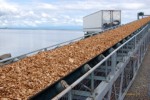The Borough and the company that owns a conveyor at Port MacKenzie agreed recently to settle a three-year-old lawsuit that could have continued for another four to six years. The settlement comes at a time when two large infrastructure projects are underway and potential tenants are stepping up their interest in doing business at Port MacKenzie.
NPI, LLC owns the conveyor and holds two long-term leases, one on the dock at Port MacKenzie and one immediately upland.
The settlement is a compromise. The projected costs to continue to defend the case are close to the settlement cost of $1.1 million.
Edits to lease language clarified a definition for how the Borough can lease land in the uplands area at a time when a coming rail and ferry connection and barge dock expansion will be creating tremendous economic opportunity at the port. Changes to the lease also earn the Borough fees from NPI gross revenues instead of from NPI profits.
In 2003, NPI paid $3 million for the dock lease. In the lawsuit, NPI argued that the Borough owed them $1.7 million in lease credits and demanded $12 to $20 million in cash, alleging that the Borough had interfered with timber harvests. The Borough adopted a moratorium on timber harvests in 2006 after residents near harvesting grounds complained of operations. The Borough argued that NPI did not solely need Borough timber and owes NPI nothing. The Borough, at the time, had about 100,000 acres of timber that was classified for timber harvest for all users. The State had about 750,000 acres about this same time unaffected by the moratorium. Timber on private land was also available. A poor market for timber played a role.
In the six-page settlement document, NPI is to receive
• $1.1 million
• $1.375 million in lease credits for wharfage and dockage fees
The Borough gains in this way:
• Deleting NPI’s right of first refusal: The uplands lease gave NPI the right of first refusal to lease nearby Borough land. In the extreme, this could include the dock, which is the prime real estate at the Port.
“By removing this layer we have obtained an important clarification over how the Borough leases land near the port,” said Acting Borough Manager Elizabeth Gray.
• Collecting fees from revenues not profits. The Borough can now collect fees beginning in 2013 based on gross revenues not profits. The revised formula makes it easier to compute and audit. The schedule is: at $3 million to $6 million earned in revenue for NPI, the Borough will receive 1 percent of the revenue. At $6 million to $9 million earned in revenue by NPI, the Borough will receive 2 percent of the revenue. Greater than $9 million in revenue, the Borough receives 3 percent of the revenue.
Each side is paying its own attorney fees. Christopher Slottee and Patrick Gilmore of Atkinson, Conway, & Gagnon, of Anchorage, represented the Borough.
Other agreements to lease changes include:
• Tying uplands and dock lease assignment together: The Borough can insist that both the dock and uplands lease are assigned to the same tenant.
• Reducing and tying lease period: The length of the uplands lease and dock lease for NPI were different. The Uplands lease was expiring in 2031 with NPI having the sole discretion to extend to 2061. The dock lease was set to expire in 2033. Now, both leases for NPI are tied together and expiring in 2041.
• Amending the 2001 uplands lease to allow the loading of more than woodchips similar to the 2003 dock lease. This allows the loading of bulk materials including sand, gravel, woodchips, peat, grains, and coal.
As part of that uplands amendment, NPI will modify the conveyor to prevent coal dust from scattering and shall include a watering system.
The $1.1 million settlement will mostly be paid by funds that have been previously set aside for the case.
For more information call Borough Attorney Nicholas Spiropoulos at (907)745-9676 or Acting Borough Manager Elizabeth Gray at 745-9687.
For court documents please contact the Alaska Superior Court in Palmer.
—End—

